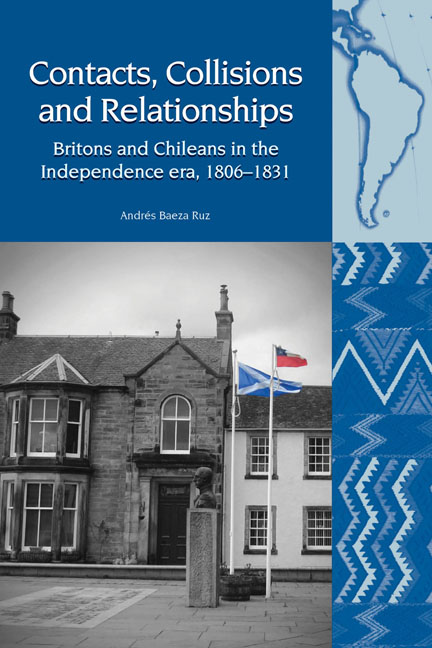Book contents
- Frontmatter
- Contents
- Acknowledgements
- Abbreviations
- Preface
- Introduction
- 1 Invasions, Negotiations and Conspiracies: British-Chilean Relations in an Era of Change, 1806–1817
- 2 Cultural Encounters Offshore: Britons and Chileans in the Chilean Navy, 1817–1823
- 3 Bibles, Schools and Citizens: British Protestant Missionaries and Educators in Chile, 1817–1831
- 4 British Merchants, Private Interests and the Fostering of Free Trade in Chile, 1811–1831
- 5 Beyond Diplomacy: The Cultural Significance of British Recognition of Chile's Independence, 1817–1831
- Conclusion
- Bibliography
- Index
3 - Bibles, Schools and Citizens: British Protestant Missionaries and Educators in Chile, 1817–1831
- Frontmatter
- Contents
- Acknowledgements
- Abbreviations
- Preface
- Introduction
- 1 Invasions, Negotiations and Conspiracies: British-Chilean Relations in an Era of Change, 1806–1817
- 2 Cultural Encounters Offshore: Britons and Chileans in the Chilean Navy, 1817–1823
- 3 Bibles, Schools and Citizens: British Protestant Missionaries and Educators in Chile, 1817–1831
- 4 British Merchants, Private Interests and the Fostering of Free Trade in Chile, 1811–1831
- 5 Beyond Diplomacy: The Cultural Significance of British Recognition of Chile's Independence, 1817–1831
- Conclusion
- Bibliography
- Index
Summary
Introduction
The seamen who travelled with Cochrane and arrived in Chile did so as individuals with their own diverse personal projects. All of them joined the navy for different reasons and had different destinies during the war for independence. Some died, others deserted; some went back home and others remained in Chile. None of them were representing others’ interests. They travelled to Chile pursuing their own personal goals. This was not the case, however, of all the Britons who travelled to Chile in the period. Some individuals travelled because they were representing the interests of another group of individuals and not only their own personal projects. This was the case of the British Protestant societies that emerged in Britain from the late eighteenth century and sent agents and missionaries to different parts of the world. These societies embarked on what they saw as a global mission aimed at civilising the rest of the world. Some of them, like the British and Foreign Bible Society (BFBS) and the British and Foreign School Society (BFSS), reached South America and Chile when the struggles for independence were coming to an end. This chapter analyses the process of interaction and the exchange of ideas and practices between the agents of these societies who travelled to Chile in the 1820s and the Chileans who were involved in the construction of the new state.
The independence of Spanish America was seen as a new opportunity to expand the sphere of influence of these societies beyond the boundaries of the British Empire. A territory that had previously been ruled by the Spanish king and subject to the power of the Catholic Church was now regarded as a potential land for an evangelising mission. The more ‘liberal’ environment brought about by the new ruling elites and the supposed declining power of the Catholic Church in the new political context were seen as the main factors that would facilitate their mission. However, the reality that British Protestant missionaries found in Spanish America was much more complex. On the one hand, the Catholic Church still exerted a great degree of power and influence and many clergymen openly opposed the activities of these societies in Spanish America. Despite this, these societies were welcome and even ‘invited’ by the new ruling elites to provide knowledge and expertise in the organisation of the new states.
- Type
- Chapter
- Information
- Contacts, Collisions and RelationshipsBritons and Chileans in the Independence era, 1806-1831, pp. 110 - 152Publisher: Liverpool University PressPrint publication year: 2019



